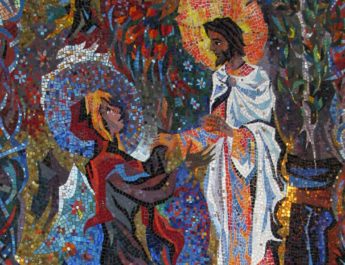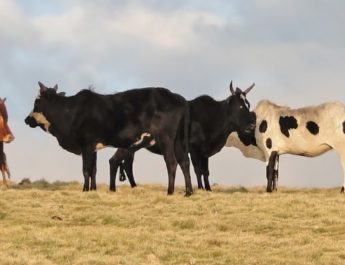Isaiah 6:1-8
Narrative Lectionary
1 In the yearI that KingII UzziahIII died,IV
I “year” = shanah. From shana (to change, alter). This is a year, age, old. It can also mean yearly.
II “King” = melek. From malak (to be or become king or queen, to rise to the throne, to be crowned; by implication, to take counsel). This is king or royal.
III “Uzziah” = Uzziyyah. From oz (strength in the sense of force, majesty, praise, material and physical strength, the abstract notion of security; also social or political power); {from azaz (to be strong, become fixed, be bold, prevail, be impudent; it means to be stout literally or figuratively. A Late Hebrew word)} + Yah (the shortened form of the name of the God of Israel; God, Lord); {from YHVH (proper name of the God of Israel; God, Lord; the self-existent or eternal one); from havah (to become) or hayah (to be, become, happen)}}. This is Uzziah, meaning “my strength is the Lord.”
IV “died” = mavet. From muth (to die in a literal or figurative sense). This can be death, deadliness, the dead, or the place where the dead go. It can be used figuratively for pestilence or ruin.
I sawV the LordVI sittingVII on a throne,VIII
V “saw” = raah. This is to see in a literal or figurative sense so stare, advise, think, view.
VI “Lord” = Adonai. From adon (lord, master, owner); root means to rule or be sovereign. This is the actual Hebrew word for Lord used (in a different form) of humans and (in the present form) of God. It means someone who is in control.
VII “sitting” = yashab. This is to sit and so to remain and so to dwell. It is sitting for any reason – as a judge, in order to ambush, or just sitting quietly. Causatively, this can mean settling or marrying. This can also mean continue, endure, or establish.
VIII “throne” = kisse. From the same as kese (full moon); perhaps from kasah (to cover, conceal, overwhelm; to cover as clothes do or to hide a secret). This is throne – a seat that is covered or has a canopy. Thus, it is a seat that conveys authority.
highIX and lofty;X and the hemXI of his robe filledXII the temple.XIII
IX “high” = rum. This is to rise or raise, to be high literally or figuratively. So it can also mean to exalt or extol.
X “lofty” = nasa. This is to lift in a broad sense, literally and figuratively. So it could be to carry, take, or arise. It could also be bring forth, advance, accept.
XI “hem” = shul. 11x in OT. This is hem or the train of a dress or robe.
XII “filled” = male. This is fill, satisfy, replenish, accomplish, fulfill, confirm, or consecrate. It is fill in a literal or figurative sense.
XIII “temple” = hekal. Perhaps from yakol (to be able, endure, overcome, prevail). This is a large building with public access such as a palace or temple.
2 SeraphsXIV were in attendanceXV aboveXVI him; eachXVII had sixXVIII wings:XIX
XIV “seraphs” = saraph. 7x in OT. From saraph (to burn or kindle). This is burning or fiery. It can be a poisonous serpent or a seraph (seraphim). The heavenly being might be fiery or copper colored.
XV “were in attendance” = amad. This is to stand up in a literal or figurative sense. So it can be establish, continue, endure, take a stand, act, be a servant, stand still, remain, stand against an enemy.
XVI “above” = ma’al. From alah (to go up, ascend, be high, be a priority; to arise in a literal or figurative sense). This is the upper part, forward, high above, upwards, greater, heaven, or exceedingly.
XVII “each” = echad. Perhaps from achad (to unify, continue on a path; figuratively, to gather one’s thoughts). This is the number one, first, united. It can also be alone, altogether, a certain, a few.
XVIII “six” = shesh. This is six. Figuratively, it can be a surplus since it is one more than the number of fingers on the hand.
XIX “wings” = kanaph. This is wing, edge, corner, extremity. It can also be a flap or fold of a garment or the pinnacle of a building.
with twoXX they coveredXXI their faces,XXII and with two they covered their feet,XXIII and with two they flew.XXIV
XX “two” = shenayim. From sheni (double, again, another, second); from shanah (to fold, repeat, double, alter, or disguise). This is two, both, second, couple.
XXI “covered” = kasah. Perhaps related to “throne” in v1. Se note VIII above.
XXII “faces” = paneh. From panah (to turn, face, appear). This is face in a literal or figurative sense. It could be face, presence, anger, respect. It can also be used of God to indicate divine favor or presence.
XXIII “feet” = regel. This is foot, endurance, or journey. It is a foot as the means of walking and so it implies a step or a greater journey. It can be used euphemistically for private parts.
XXIV “flew” = uph. This is to fly, flee, be weary. It can also mean to cloak with wings or darkness.
3 And one calledXXV to anotherXXVI and said:
“Holy,XXVII holy, holy is the LordXXVIII of hosts;XXIX
XXV “called” = qara. This is to call or call out – to call someone by name. Also used more broadly for calling forth.
XXVI “one…to another” = zeh + el + zeh. Literally, “this to this.”
XXVII “holy” = qadosh. From qodesh (set apart and so sacred; God is different from us and so God is holy/set apart; things we dedicate to God’s service are set apart for God and so they, too, are holy); related to qadash (set apart, consecrated, hallowed, sanctified; something or someone set apart for a holy purpose or use – ceremonially or morally clean). This is sacred or holy in a ritual or moral sense. As a noun, it refers to a holy one (like a saint or angel), a holy place (the sanctuary), or God (the Holy One).
XXVIII “Lord” = YHVH. Related to “Uzziah” in v1. See note III above.
XXIX “hosts” = tsaba. From tsaba (to wage war, serve, assemble, fight, perform, muster, wait on). This is a large group of persons (used figuratively for a group of things). It implies a campaign literally as with army, war, warfare, battle, company, soldiers. Can also be used figuratively for hardship or for worship.
the wholeXXX earthXXXI is fullXXXII of his glory.”XXXIII
XXX “whole” = kol. From kalal (to complete). This is all or every.
XXXI “earth” = erets. Root may mean to be firm. This is earth, ground, field land, or country.
XXXII “full” = melo. Related to “filled” in v1. From male (see note XII above). This is fullness in a literal or figurative sense.
XXXIII “glory” = kabod. From kabad (to be heavy, weighty, burdensome). This is weighty. Figuratively, glorious, abundant, riches, honor, splendor – a reference to one’s reputation or character. This word is often used to describe God and God’s presence.
4 The pivotsXXXIV on the thresholdsXXXV shookXXXVI at the voicesXXXVII of those who called, and the houseXXXVIII filled with smoke.XXXIX
XXXIV “pivots” = ammah. From the same as em (mother). This is a cubit, post, threshold, pivot. It is mother as the basic measure (the length of the forearm). It is also mother as the which bonds an entryway i.e. the base of the door.
XXXV “thresholds” = saph. From saphaph (to guard at the door; snatch from, bring an end to). This is some kind of dish like a basin, cup, or bowl. It can also be the threshold (as of a door).
XXXVI “shook” = nua. This is to waver in a literal or figurative sense. So, it could be to tremble, quiver, totter. It could also refer to a fugitive.
XXXVII “voices” = qol. This is a sound, used often for human voices. Also used when God speaks or angels, animals or instruments. It can be a cry or a noise, thunder or earthquakes and so on.
XXXVIII “house” = bayit. Probably from banah (to build, make, set up, obtain children; to build literally or figuratively). This is house, court, family, palace, temple.
XXXIX “smoke” = ashan. Perhaps from ashan (to smoke or burn in a literal or figurative sense; to be angry). This is smoke, vapor, dust, or anger.
5 And I said: “WoeXL is me! I am lost,XLI for I am a manXLII of uncleanXLIII lips,XLIV
XL “woe” = oy. Perhaps from avah (to desire, crave, wish for, lust after). This is a mournful cry – woe, alas. Perhaps where the Yiddish “oy” comes from.
XLI “am lost” = damah. 15x in OT. This is to be silent, to cease, destroy, perish.
XLII “man” = ish. Perhaps from enosh (human, humankind, mortal); from anash (to be weak, sick, or frail). This is man, husband, another, or humankind.
XLIII “unclean” = tame. From tame (to defile, be unclean, pollute in a ritual or ethical sense). This is unclean, ill, or ritually impure.
XLIV “lips” = saphah. This is lip, edge, border, bank – used for a boundary. It can also be speech or language.
and I liveXLV amongXLVI a peopleXLVII of unclean lips; yet my eyesXLVIII have seen the King, the LordXLIX of hosts!”
XLV “live” = yashab. Same as “sitting” in v1. See note VII above.
XLVI “among” = tavek. This is among, middle, in the midst, the center. Perhaps, properly, to sever.
XLVII “people” = am. From amam (to darken, hide, associate; creating shadows by huddling together). This is people or nation. It can be used specifically for a tribe, collectively of troops or armies, or figuratively to refer to a flock of animals.
XLVIII “eyes” = ayin. This is eye in a literal or figurative sense so eye, appearance, favor, or a fountain (the eye of the landscape).
XLIX “Lord” = YHVH. Same as “Lord” in v3. See note XXVIII above.
6 Then oneL of the seraphs flew to me, holdingLI a live coalLII that had been takenLIII from the altarLIV with a pair of tongs.LV
L “one” = echad. Same as “each” in v2. See note XVII above.
LI “holding” = yad. Literally, “in his hand.” This is hand, ability, power. Hand in a literal sense, but also what one can do or the means by which one does it.
LII “live coal” = ritspah. Related to “seraphs” in v2. 8x in OT. From reseph (coal or a hot stone used for cooking); from resheph (flame, flash, burning coal, spark, lightning, arrow, fever); from saraph (see note XIV above). This is a coal, hot stone, or pavement.
LIII “taken” = laqach. Related to “pair of tongs” in v6. See note LV below.
LIV “altar” = mizbeach. From zabach (to kill, slay, offer; slaughtering an animal to offer as a sacrifice). This is an altar.
LV “pair of tongs” = melqach. 6x in OT. From laqach (to take, accept, carry away, receive). This is tongs or snuffers.
7 The seraph touchedLVI my mouthLVII with it and said: “NowLVIII that this has touched your lips, your guiltLIX has departedLX and your sinLXI is blotted out.”LXII
LVI “touched” = naga. This is touch, reach, arrive, come near, strike. This is touching for any reason including sexual or violent.
LVII “mouth” = peh. This is mouth in a literal or figurative sense. So, more literally, it can be beak or jaws. More figuratively, it refers to speech, commands, or promises.
LVIII “now” = hinneh. From hen (lo! Behold! If, though; an expression of surprise). This is to draw attention, show suddenness or surprise, or to emphasize the importance of the coming statement. See! Lo! Behold!
LIX “guilt” = avon. Perhaps related to avah (to bend, twist, be amiss). This is sin, mischief, guilt, fault, punishment for iniquity, or moral evil.
LX “departed” = sur. This is to turn aside in a literal or figurative sense – to depart, decline, rebel, remove, or withdraw.
LXI “sin” = chatta’ah. From chata’ (to miss or go wrong and so to sin, bear the blame; it can also include the sense of forfeiting or lacking). This is sin itself as well as punishment for sin. It is sometimes used specifically to refer to sin that is habitual.
LXII “blotted out” = kaphar. This is to appease, cover, pacify, cancel, make atonement, placate. Specifically, it can mean to cover with bitumen.
8 Then I heardLXIII the voice of the LordLXIV saying, “Whom shall I send,LXV and who will goLXVI for us?”
And I said, “Here am I;LXVII send me!”
LXIII “heard” = shama. This is to hear, call, consent, or consider. It implies listening intelligently, giving attention, and, because of these two factors, obedience and action are often implied.
LXIV “Lord” = Adonai. Same as “Lord” in v1. See note VI above.
LXV “send” = shalach. This is to send out, away, send for, forsake. It can also mean to divorce or set a slave free.
LXVI “go” = halak. This is go, come, walk. It is walk literally and figuratively and includes people and animals. It can be used figuratively for one’s moral life – how we walk according to God’s way or against it. It can also refer to the walk of life as in the course one’s life takes, the choices we make, etc.
LXVII “here am I” = hen. Related to “now” in v7. See note LVIII above.
Image credit: “Live Coals” by Julay Cat, 2010.




